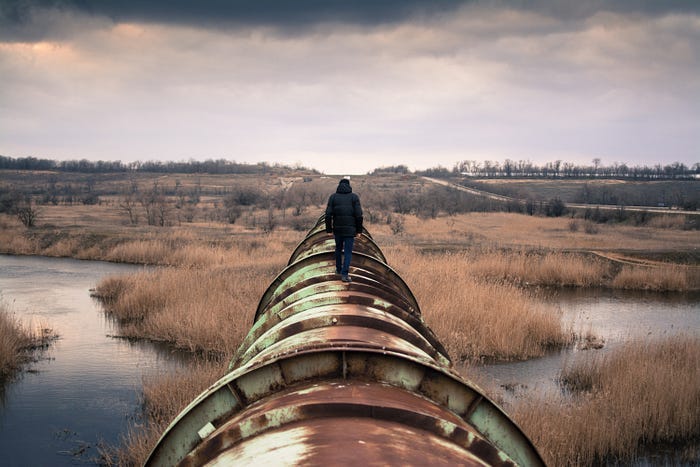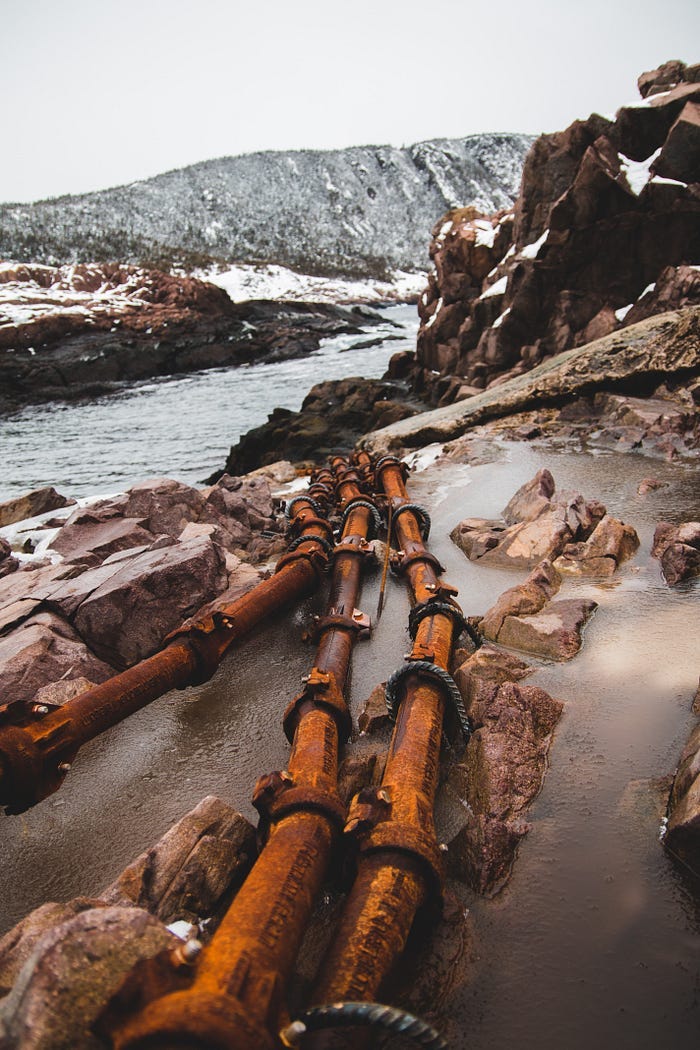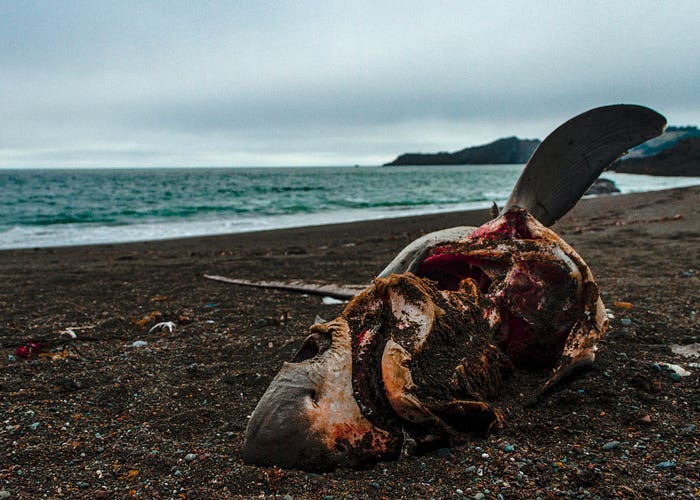In the Battle for Human Life, Pipelines Are a Threat
It isn’t just climate change, it’s poison in the water

It’s impossible to build an oil pipeline that never leaks.
That’s my assumption at least, going off of the data we have so far. To my knowledge, there has never been a pipeline that hasn’t leaked at least once. Millions upon millions of barrels’ worth pour into the earth, the groundwater and the oceans every year.
For all of the destruction we create just harvesting and refining the stuff, isn’t it astonishing how much of it is wasted just in transport?
Back in April, the infamous Keystone Pipeline busted open, spilling hundreds of thousands of litres of crude into the surrounding ecosystem.
That surrounding ecosystem was farmland; worked soil in North Dakota that is home to wheat fields, corn crops and soybeans. Things that we eat, and things that we feed our livestock.
The company that owns the pipeline shut it down for a week, and it was immediately determined that the damage was caused by a rupture in the welding between two lengths of pipe.
Under pressure, the weight of the oil proved to be too much and it burst. Luckily there were workers nearby who heard the sound of metal giving way, and they were able to get it under control quickly.
This is hardly the first time Keystone has sprung a serious leak — its track record is atrocious, and to date, the number of known spills along this one line is 23 and counting.
They caught it quickly this time. Most pipeline leaks that happen in less well-travelled areas don’t get noticed right away.
Company regulators involved in the clean-up insist that there have been no reports of harm done by the leak to the local population or wildlife.
Right.
How stupid do they think we are?

It’s not particularly reassuring to be told there have been no reports of injury or illness from a recent spill. Many of the harmful effects of crude oil leaks don’t show up for years.
The immediate aftermath is pretty terrible, of course; miles of earth and water covered in thick globs of muck, birds and other wildlife utterly coated in the toxic goo. Animals frequently die of suffocation and drowning without immediate help.
Beaches are regularly shut down due to oil leaks out in the ocean, and with good reason. Nobody wants to surf on oil, for one thing. But the aesthetics of the spill are not the biggest issue.
Do you know how poisonous crude oil actually is? Do you know what exposure to it can do to you long term?
Back in 2010, the Deepwater Horizon spill leeched around 134 million gallons of oil into the Gulf of Mexico. This event is considered one of the largest environmental disasters in world history; the leak lasted 87 days, and the clean-up was grueling to say the least.
I remember watching reports about it on the news. I was barely a teenager, but even to me it was frightening to see how much of a struggle it was to contain.
Crude oil contains a mixture of many different chemicals, many of them extremely toxic. Workers involved in the Deepwater Horizon spill were directly exposed to them during the cleanup operation.
How are they doing? Not well. 7 years after the disaster, workers continued to report severe and chronic respiratory and cardiac symptoms. They developed rashes, blood disorders, and many other problems.
Some of their symptoms appeared right away. Others didn’t show up for years.
Forgive me for not taking the company’s reassurance at face value.
Fifteen years after the fact, people who worked on the Deepwater Horizon cleanup are still seriously sick. Some have developed cancer, likely as a result of their exposure to the crude oil.
Just like many other disasters, the cleanup followed a predictable pattern. Local people, many of them already living in poverty, rushed in to help protect their homes.
They were told it was safe, and found out later they were lied to. According to the lawsuit that they brought against BP, they insist that the corporation did not inform them about the potential for illness. They also alleged that the company did not adequately monitor them for signs of toxicity after the fact.
Even the chemical used to break up the oil spill, Corexit, turned out to cause illness in the people who handled it. Even managing the oil spill can be its own kind of disaster if a large company decides to cut corners on worker safety.
Given the fatality rate among workers in the Oil and Gas Extraction industry, I don’t really feel confident that they won’t. I’m especially dubious because the number of deaths that occur from accidents and workplace incidents in the OGE industry are almost certainly underreported.
I’ve said it before, and I’ll say it again: So long as the profits they make are higher than the legal fees they incur, corporations will keep cutting corners to hoard more cash.
Human lives are just numbers on a spreadsheet to the guy sitting in an air-conditioned office. He’s not going out there. Why should he care?
When the only penalty for loss of human life and destruction of the natural world is a fine, then all you’re saying is that the crime carries a price tag.
If that price is less than the profits a company makes by cutting corners, then they have no incentive to change their ways. It is simply the cost of doing business. All other costs involved — like medical care and reduced lifespans — are an externality.
They get to wash their hands of it and go home. The people who get hurt are on their own.
How severe is the damage from this leak going to be? I don’t know.
We have no way of knowing unless we’re given an honest and reliable assessment years down the line — and given the Trump administration’s track record on environmental issues and contamination, I’m not holding my breath for anything more than a parcel of bullshit with a nice ribbon.
There are a lot of factors and variables at play, and a full picture of the impact and damage will have to wait until the people in charge of regulations and public safety are actually allowed to do their damn jobs.
Until then, we get to sit back and watch yet another environmental catastrophe play out before our eyes. We get to sit here and ponder the inevitable fallout of the toxic chemicals being released into the land we live on.
The very same ground that we repeatedly poison, over and over again, every single year.
When we drill oil, we spill oil. It’s not just a trite maxim, it’s a simple fact. It is not avoidable, and it will keep happening as long as we keep pushing fossil fuels as our primary source of energy.
Quite apart from the serious danger posed by climate change, the simple fact is that we’re dumping lethal doses of toxic chemicals into our water and our farmlands, and it isn’t necessary.
We could stop. We need to stop.
So long as the profits are higher than the legal fees incurred, OGE corporations will keep letting this happen. They’ll keep chasing that black gold, and they’ll keep leaving our communities to shoulder the burden when they screw up.
If we want this to stop, we need to demand better regulation from our governments. We need legal ramifications for the harms they cause.
Frankly, we need to see jail time on the table. A slap on the wrist does not cut it anymore, if it ever did.
Anything less than that, and we might as well drink poison straight from the bottle.
Solidarity wins.





Pipelines are so often sold as net goods that environmentalists are foolish to oppose. They reduce GHG emissions, they say!
This is just another of the lies and distortions the industry loves. I just wrote about the "pipelines are good for climate change," lie here:
https://open.substack.com/pub/habitatrecoveryproject/p/the-lie-pipeline-developers-love?r=52vkqq&utm_campaign=post&utm_medium=web&showWelcomeOnShare=false
Good luck with that. Trump's Big Beautiful Bill will only make this worse with the new subsidies for the fossil fuel industry. I hope the Canadians fare better than the Americans, given that you are working on sending more of your oil overseas instead of to the U.S.